Socrates Jones: Pro Philosopher
| Socrates Jones: Pro Philosopher | |
|---|---|
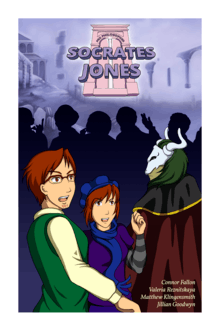 Main characters Socrates Jones and his daughter Ari | |
| Publisher(s) | Kongregate |
| Platform(s) | Browser |
| Release | August 20, 2013[1] |
| Genre(s) | Visual novel, educational game |
| Mode(s) | Single-player |
Socrates Jones: Pro Philosopher is an educational point-and-click browser game and visual novel developed by a group of students and faculty at Carnegie Mellon University collectively called Chief Wakamkamu[2] and released on Kongregate. In the game, the eponymous player character Socrates Jones debates various historical philosophers to unravel the nature of morality. It was inspired by Ace Attorney, from which it borrows a number of core mechanics.
Development
Conception
Connor Fallon originally played the Ace Attorney series in 2009, and began to wonder what it would be like if the core gameplay was applied to philosophy instead. A year and a half later, he assembled a team to implore this concept.[3][4] While originally treated as a comical one-off experiment, it became quite compelling as it was explored further.[5] A prototype was originally created, which led the team to return to the project and adapt it into a full-fledged game.[6] Alongside his Carnegie Mellon philosophy professor Andy Norman and friends from the Game Creation Society, they came up with three design goals:[3][4]
- The game should teach the fundamentals of Critical Thinking.
- The game should introduce players to the ideas of key historical philosophers
- The game should be enjoyable even to those who have never had an interest in philosophy.
Design
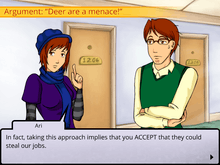
Fallon and Valeria Reznitskaya would become the game's primary developers.[7] The design team noted early on that while Ace Attorney's "inventory" comes in the form of concrete evidence, Pro Philosopher would have to rely on ideas, which are more abstract. Early development introduced a mechanic called the "idea cloud" which would simulate pulling ideas out of thin air, but these concepts were always restricted by the fact that they would be limited by what the programmers had entered. They decided instead to simplify gameplay by simulating the Socratic Method, in which the same critical thinking questions could be asked of each statement to break them down.[3][4]
The designers noted during playtesting that there were alternate solutions to some of their puzzles. For instance, in the first round, the salesman comically argues that “deer steal our jobs”, which the player is meant to counteract by Asking for Backing. However, some players presented the idea that “Deer live in the Woods”, arguing that they couldn't steal human jobs due to their location. They conceded that this was a valid move and wrote in a customised response to it.[3][4] One important game mechanic was the ad hominem attack "Your face is ugly", which always fails in-game and was designed to teach players that this type of argument is unhelpful and flawed.[8] The game was designed to be more flexible and interactive than a book or film presentation of such philosophical debates would be.[9]
Release and aftermath

In early 2013, a beta build was uploaded to lockandkeychain.net, and playtesters were solicited from gaming forums.[10] Socrates Jones: Pro Philosopher was released as a free browser game, originally uploaded to Kongregate in August 20, 2013.[11][12] The game achieved a level of popularity through a let’s play on the YouTube channel Philosophy Tube, and by being hosted on non-edutainment related Flash game sites.[13] By March 2014, the game had been played over 300,000 times, and was in the process of being translated into multiple languages.[14] It has been used in classrooms around the world.[15] As of April 2018, the game was played 491,518 times at Kongregate[16], 20,000 times at JayIsGames[17], 72,574 times at Newgrounds[18], and 4515 times at BuzzedGames.[19]
Ultimately Fallon believed the team had not nearly solved all problems that come with making a game about philosophical debating, settling on a concrete mechanics, logic puzzles, and single solutions. But he believes the "necessarily simplified representation"[9] is successful in teaching players the basic principles to use beyond the context of the game, and opened up the door for future developers to further explore the themes.[3][4] Fallon intended to continue his career by telling more "odd interactive stories".[20] The team followed this game with a similarly philosophical game entitled The Chinese Room[9] and a Hamlet-inspired game named Elsinore where Ophelia is trapped in a Groundhog Day loop and just escape her fate.[21]
The game has been used as part of the Berkeley syllabus regarding Social Implications of Computing.[22]
Gameplay
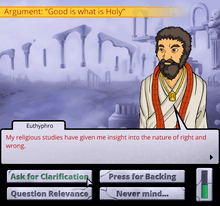
The gameplay of Socrates Jones: Pro Philosopher heavily borrows from that of the Ace Attorney series, going as far as to modify the catchphrase "Objection!" to "Nonsense!" to fit the game's topic.[23][24] In the game, the player has the opportunity to carefully examine each sentence of their opponent and ask for clarification, ask for the sentence' relevance or press the opponent to back up his statement. Furthermore, the player can challenge any claim their opponent makes by bringing up a counter-argument collected earlier in the argument. According to speakers at the 2014 ifMUD Interactive Fiction discussion, "the character has a set of things they need to explain/justify/come to terms with, and then a series of rhetorical moves they can make".[25]
Claims by the opponents are drawn from the "common ground" of what both the player character Socrates and the opponent agree to be true. "Grass is green" would be an example of this. The opponent then builds on his claims in order to draw a conclusion. If a claim is vague, irrelevant or does not build up from the common ground, the player can question it. The player wins a round when they challenge a statement made by their opponent with a counter-argument. For example, if the opponent would now claim that "there are no green things," the player could counter this claim by selecting "Grass is green."[24][26] The game has a "a chronological difficulty curve", increasing in challenge as the player meets more recent figures.[27]
Lastly, if the player makes too many mistakes, their credibility meter depletes. When Socrates loses all of his credibility, a game over screen appears and the player has to restart the round. The music mimics that of the Ace Attorney series, with simple repeating motifs that gradually increase their sense of urgency as the player inches toward victory.[28]
Plot
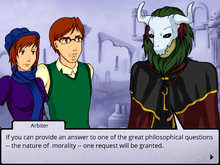
The game starts with accountant Socrates Jones describing how his entire family is interested in philosophy, except for himself, wondering "Why should I care about the nature of right and wrong?"[29] In the first scene, his daughter Ari teaches Socrates the basics of debating during a discussion with a door-to-door salesman who was trying to sell a logically useless product: deer repellent.[30]
After this scene, Socrates and his daughter Ari end up in a car accident by driving into a deer and find themselves trapped in "The Intelligible Realm," an afterlife for philosophers. According to the Arbiter, the discussion moderator, the only way back to the world of the living is by finding the nature of morality, a key topic in philosophy. What follows are five discussions with deceased philosophers Euthyphro, Protagoras, Thomas Hobbes, John Stuart Mill and Immanuel Kant, none of which having an impervious solution.
During those discussions, the Arbiter reveals that Socrates' namesake is the only one to have found the answer, after which no one saw him again.
At the end of the game, Socrates makes the offhand statement that the nature of morality might be impossible to find.[31] The arbiter takes this statement as his answer and declares it to be wrong, resulting in a final debate between Socrates and the Arbiter about whether the nature of morality could be found. In the end, impressed by Socrates' arguments, the Arbiter (who is revealed to be Socrates Prime, who took the first Arbiter's post after convincing him that his answer was correct) lets both him and his daughter leave The Intelligible Realm.
During the credits scenes of Socrates, Ari, Kant and the other philosophers after the game's events are shown - Socrates buying a huge amount of deer repellent, Ari giving a lecture on Hobbes, Kant thinking about growing a beard and the other philosophers falling asleep from Euthyphro's preachings.
Reception
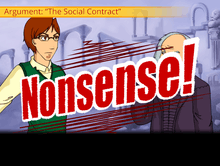
Jay Is Games was very positive about the game, stating that it is "all about teaching you how to debate people in every day life" while still being "fun and engaging."[23] Furthermore, according to the editor, the characters in Socrates Jones are "interesting, and the topics they discuss doubly so."[23] However, they also state that it is by design a "wordy" game and that players looking for more adventure-like aspects might find it too linear.[23] In a 2013 article, Adventure Gamers noted the game demonstrates how intelligent a game could be, offering a light tone while exploring serious intellectual discussions.[32] A 2015 article by the site further described the debates as witty and thought-provoking, and noted that while gameplay was unoriginal, the context to which it was applied was "perfect" and compelling.[33] Teen Ink felt the game's lack of ambition had led to a simple teacher tool, whereby expanding the narrative-based campaign would have led to more respect from the gaming and education community; the site also compared it to the edutainment titles ARTé Mecenas and iCivics' Argument Wars.[34] NeoTeo appreciated the title as a "sincere attempt" to explore themes not attempted in previous games, though noted various flaws, for instance, containing unrealistic arguments; finally the site discouraged non-English speakers from playing it.[35]
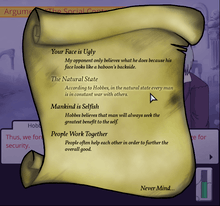
French review site Gamesidestory called Socrates Jones a gem, commending the game's original concept and philosophical content, and praising its "eloquent" conclusion.[30] Gamesidestory did critique the game's short length, stating that the seven debates included in the game simply weren't enough.[30] Matt Kodner of The Gameological Society was less positive about the game, stating that "much of the game boils down to you responding with, 'Nope, you’re wrong, and here’s why,'" which according to him gets old fast. Kodner describes the game as a "novel introduction to philosophy, but it never goes beyond that."[36] Nevertheless, he noted that the game lovingly borrows from Ace Attorney and captures the original’s snappy sense of humor.[36] IndieGames.com believes the game teaches players how to correctly argue, and would satiate intelligent players' need to "poke holes in everyone's arguments".[37] The title encouraged Baptist/fundamentalist game designer Samuel Garcia to ponder about the nature of God in relation to morality due to the Euthyphro round which poses the question: “Is what is morally good (holy) commanded by a god because it is morally good (holy), or is it morally good because it is commanded by a god?”.[38]
The 2017 book Ten Things Video Games Can Teach Us: (about life, philosophy and everything) argues that the game teaches players to "learn about learning".[39] Geektimes desired to discuss the game with "unusual gameplay" in the hopes that it would inspire future games that explored similar subject matter.[40] PC Gamer noted that the game contained "a lot of text, a lot of clicking, and some great conversation".[41] CMU’s Department of Philosophy faculty member Andy Norman felt the game was an "exceptional example of gaming’s educational potential" and a prime example of a space where "work and play become all but indistinguishable".[42] Random Access thought that while it wouldn't appeal to the average gamer, the title offered a special experience to gamers who were also lovers of knowledge.[43] The game was a 2014 entrant in the Independent Games Festival; the judges felt the game was entertaining and funny while incidentally imparting important critical thinking skills.[44] Your Tewksbury Today thought the "obvious parody" was both funny and thought provoking.[45]
References
- ↑ "Socrates Jones: Pro Philosopher". Moby Games.
- ↑ "Socrates Jones: Pro Philosopher". Adventure Gamers. Retrieved 2018-04-02.
- 1 2 3 4 5 Fallon, Connor (August 21, 2013). "Making a Debate Game: the Design Challenges of Socrates Jones". Gamasutra. Retrieved 2018-04-02.
- 1 2 3 4 5 Fallon, Connor (August 25, 2013). "Making a debate-style game in the vein of Ace Attorney". IndieGames.com. Retrieved 2018-04-02.
- ↑ Webber, Jordan Erica; Griliopoulos, Daniel (2017-08-17). Ten Things Video Games Can Teach Us: (about life, philosophy and everything). Little, Brown Book Group. ISBN 9781472137920.
- ↑ "Socrates Jones: Pro Philosopher". 2014-06-14. Archived from the original on 2014-06-14. Retrieved 2018-04-02.
- ↑ "IndieGames.com Browser Pick: Ace Attorney-like Socrates Jones: Pro Philosopher teaches arguing". indiegames.com. Retrieved 2018-04-02.
- ↑ Webber, Jordan Erica; Griliopoulos, Daniel (2017-08-17). Ten Things Video Games Can Teach Us: (about life, philosophy and everything). Little, Brown Book Group. ISBN 9781472137920.
- 1 2 3 Webber, Jordan Erica; Griliopoulos, Daniel (2017-08-17). Ten Things Video Games Can Teach Us: (about life, philosophy and everything). Little, Brown Book Group. ISBN 9781472137920.
- ↑ "Socrates Jones: Pro Philosopher". Double Fine Action Forums. Retrieved 2018-04-03.
- ↑ "Socrates Jones: Pro Philosopher". 2014-06-14. Archived from the original on 2014-06-14. Retrieved 2018-04-02.
- ↑ "Socrates Jones: Pro Philosopher for Browser (2013) - MobyGames". MobyGames. Retrieved 2018-04-02.
- ↑ "Argument Wars | Teen Video Game Review of puzzle, strategy, law and edutainment". www.teenink.com. Retrieved 2018-04-02.
- ↑ "Last Word | Carnegie Mellon Today". cmtoday.cmu.edu. Retrieved 2018-04-02.
- ↑ "Socrates Jones: Pro Philosopher". 2014-06-14. Archived from the original on 2014-06-14. Retrieved 2018-04-02.
- ↑ "Socrates Jones: Pro Philosopher". Kongregate. Retrieved 2018-04-02.
- ↑ "Play Socrates Jones: Pro Philosopher, a Free online game on Jay is games". Jay is games. Retrieved 2018-04-02.
- ↑ "Socrates Jones: Pro Philo". Newgrounds.com. Retrieved 2018-04-02.
- ↑ "Socrates Jones: Pro Philosopher Game". www.buzzedgames.com. Retrieved 2018-04-02.
- ↑ "2017-2018 Best of SAAS Volume 17". Issuu. Retrieved 2018-04-02.
- ↑ "Class Notes". www.seattleacademy.info. Retrieved 2018-04-02.
- ↑ "Social Implications of Computing: Topics, Readings, and Assignments". inst.eecs.berkeley.edu. Retrieved 2018-09-17.
- 1 2 3 4 Dora (August 21, 2013). "Socrates Jones: Pro Philosopher". Jay Is Games.
- 1 2 Fallon, Connor (2013-08-21). "Making a Debate Game: the Design Challenges of Socrates Jones". Gamasutra.
- ↑ "Transcript of March 1, 2014 ifMUD Discussion on Interiority". Emily Short's Interactive Storytelling. 2014-03-03. Retrieved 2018-04-03.
- ↑ Norman, Andy (2009-07-15). "How to Play the Reason-Giving Game". Academia.edu.
- ↑ "Live Free Play Hard: THIS IS WHERE WE TRAIN OUR BUBBLES FOR COMBAT". Rock, Paper, Shotgun. 2013-09-22. Retrieved 2018-04-02.
- ↑ "Following Freeware: August 2013 releases". Adventure Gamers. Retrieved 2018-04-02.
- ↑ Connor Fallon, Valeria "Val" Reznitskaya, Andy Norman (2013-08-20). Socrates Jones: Pro Philosopher. Browser. Kongregate. Level/area: Tutorial - Prologue.
My name is Socrates Jones. Everyone in my family seems to care about philosophy... but I could never really get into it. I'm just an accountant, after all. Why should I care about the nature of right and wrong?
- 1 2 3 Mwarf (2013-12-02). "GameTest – Socrates Jones : Pro Philosopher (Navigateur)". Gamesidestory.
- ↑ Connor Fallon, Valeria "Val" Reznitskaya, Andy Norman (2013-08-20). Socrates Jones: Pro Philosopher. Browser. Kongregate. Level/area: Chapter 6: The End of the Road.
At this point, I kind of think that the nature of morality is impossible to find.
- ↑ "Following Freeware: August 2013 releases". Adventure Gamers. Retrieved 2018-04-02.
- ↑ "Five Years of Following Freeware: Year Four". Adventure Gamers. Retrieved 2018-04-02.
- ↑ "Argument Wars | Teen Video Game Review of puzzle, strategy, law and edutainment". www.teenink.com. Retrieved 2018-04-02.
- ↑ "Juegos Online de la Semana (22/08/13) - NeoTeo". www.neoteo.com (in Spanish). Retrieved 2018-04-02.
- 1 2 Kodner, Matt (2013-11-26). "Philosophize It". The Gameological Society.
- ↑ "IndieGames.com Browser Pick: Ace Attorney-like Socrates Jones: Pro Philosopher teaches arguing". indiegames.com. Retrieved 2018-04-02.
- ↑ Garcia, Samuel (September 25, 2013). "Let's Play Socrates Jones: The Bible and Euthyphro, Or, God is Holy, Holy is God". Theology Gaming. Retrieved 2018-04-02.
- ↑ Webber, Jordan Erica; Griliopoulos, Daniel (2017-08-17). Ten Things Video Games Can Teach Us: (about life, philosophy and everything). Little, Brown Book Group. ISBN 9781472137920.
- ↑ "Механика игр-дебатов на примере Socrates Jones: Pro Philosopher" (in Russian). Retrieved 2018-04-02.
- ↑ Sykes, Tom (August 26, 2013). "The Free Webgame Round-Up". PC Gamer. Retrieved 2018-04-02.
- ↑ "Last Word | Carnegie Mellon Today". cmtoday.cmu.edu. Retrieved 2018-04-02.
- ↑ "Browser's Castle 5: The Plight Of The Modern Philosopher // random.access". randomacc.net. Retrieved 2018-04-02.
- ↑ "Socrates Jones: Pro Philosopher". IGF. 2016-08-22. Retrieved 2018-04-02.
- ↑ "Game-On!: The Wonders of Free Online Games | Your Tewksbury Today". Retrieved 2018-04-03.